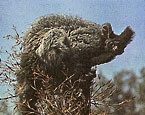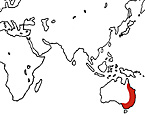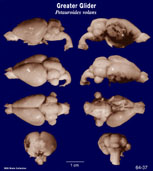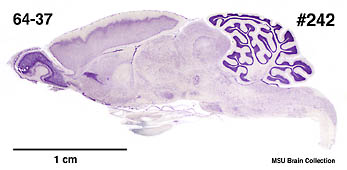|
Greater
Glider
(Petauroides volans) #64-37 |
||||
|
|
Physical
characteristics and distribution
|
|
Volans
is the singles species in the genus Petauroides, with
a head and body length of 300-480 mm and a tail length of 450-550
mm. Adults weigh between 1.2 and 1.5 kg. Coloration of the soft
silky fur ranges from black to gray to creamy white upperparts
and light gray or pure white below. White headed or all white
individuals are common. The tail is prehensile, completely furred
with the exception of the underside of the tip. Females have
two mammae and a well developed pouch. The
primary diet of P. volans is the bark, leaves and bud
debris of a specific species of Eucalyptus. |
|
Description
of the brain
|
|
Animal
source and preparation
|
|
All
specimens collected followed the same preparation
and histological procedure.
|
Other
Related Resources (websites and publications)
List of Specimens | Explore Collections | Brain Sections | Brain Evolution | Brain Development | Brain Circuitry | Brain Functions | Location and Use | Related Web Sites | Contact Us | Search MSU Database | Personnel | Home



